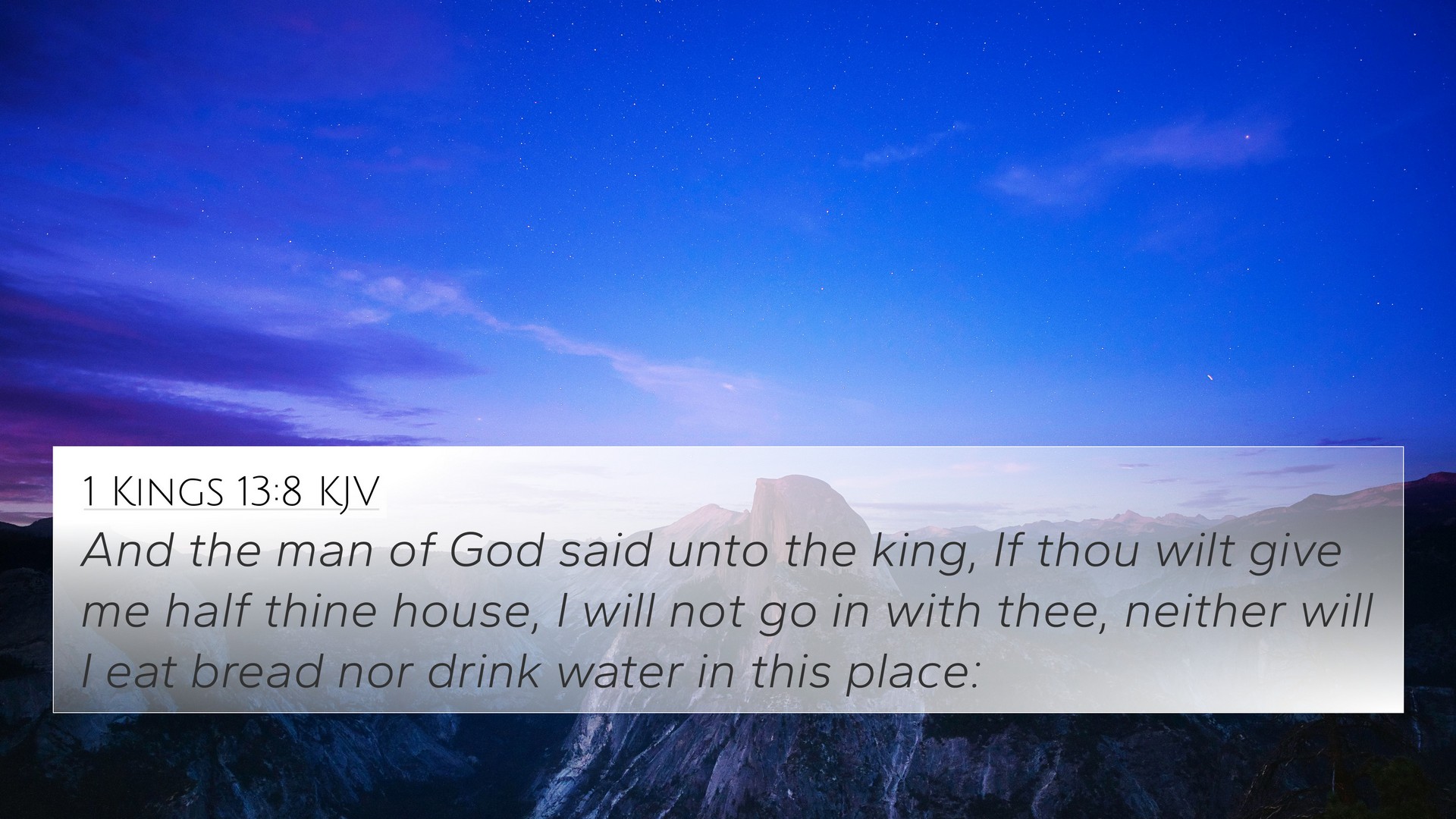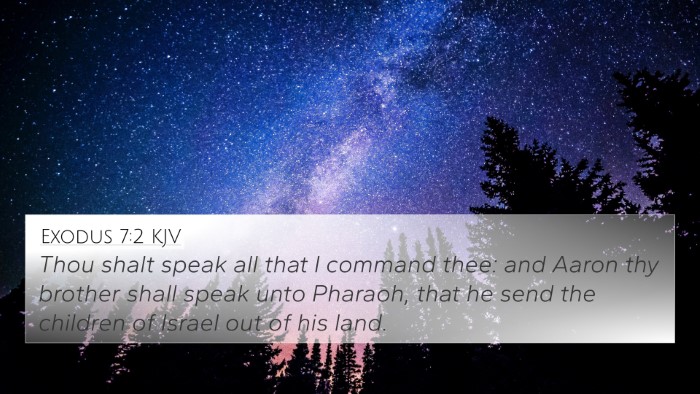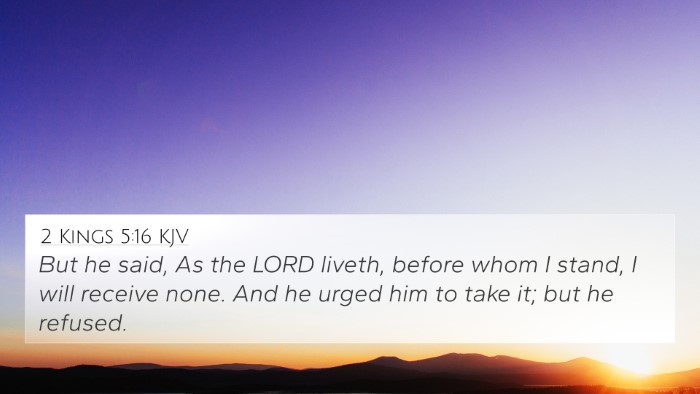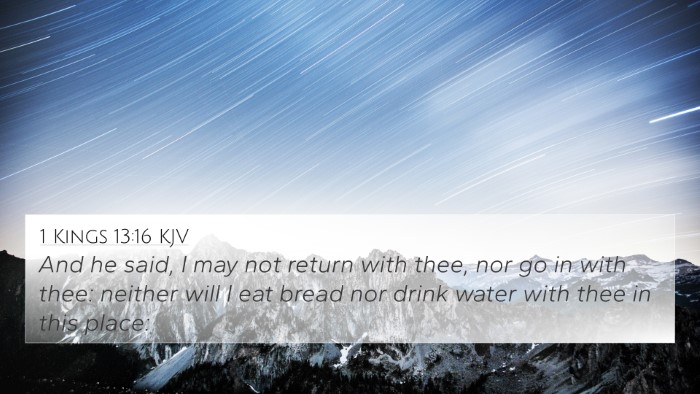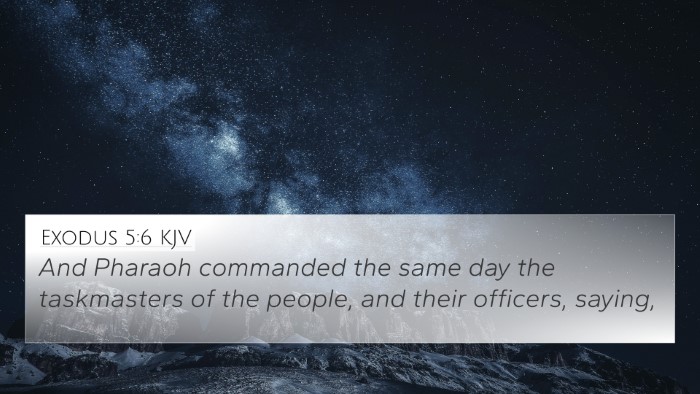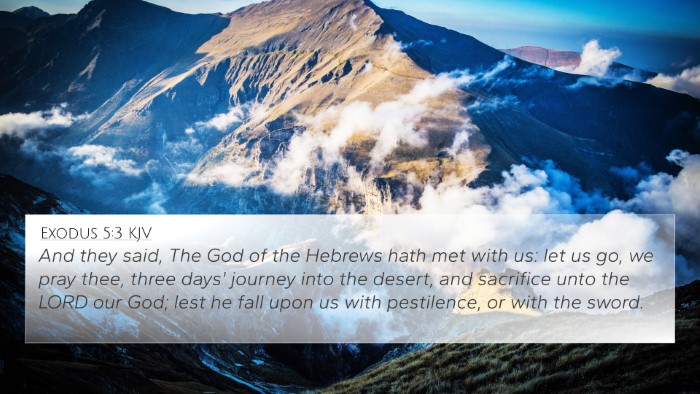Understanding 1 Kings 13:8
The verse reads: "But the man of God said to the king, 'If you were to give me half your possessions, I would not go with you, nor would I eat bread or drink water here in this place'" (1 Kings 13:8, NIV).
Insights from Commentaries
Matthew Henry's Commentary
Matthew Henry emphasizes the integrity and obedience of the prophet in this passage. The man of God refuses the king's offer, demonstrating his commitment to God's command over earthly rewards. Henry points out that the prophet's steadfastness serves as a lesson in the importance of fidelity to divine instructions, regardless of the earthly temptations around him.
Albert Barnes' Notes
Albert Barnes discusses the significance of the refusal. He notes that by rejecting the king’s offer, the prophet underscores the idea that God's servitude is not for personal gain. This reflects the core principle that spiritual callings should maintain their purity from worldly influences. Barnes also highlights the implications of the prophet's actions, suggesting that he was not swayed by royal authority, which emphasizes the importance of following God's word steadfastly.
Adam Clarke's Commentary
Adam Clarke interprets this verse as a crucial moment showing the man of God’s resolve in his mission. He reflects on the prophet's decision to maintain his dietary restrictions as a visible manifestation of his obedience to God. Clarke notes that the refusal is not just about physical sustenance but symbolizes a deeper commitment to spiritual integrity. The prophet understands that to partake in the king’s hospitality may compromise his mission and relationship with God.
Bible Verse Cross-References
- Deuteronomy 18:20-22 - Discusses the importance of true prophets and their messages.
- 2 Kings 4:40-41 - Explains the responsibilities and actions of a prophet.
- Acts 20:33-35 - Highlights Paul's refusal of riches in ministry.
- 1 Peter 5:2-3 - Encourages shepherds to lead with integrity, not for sordid gain.
- Luke 4:18-19 - Jesus speaks of His mission, showing commitment to God's purpose.
- Mark 10:23-25 - Jesus discusses the difficulty for the wealthy to enter God’s Kingdom.
- Philippians 4:11-13 - Paul speaks about being content regardless of circumstance.
- Matthew 10:8-10 - Jesus instructs His disciples to rely on God for their needs.
- 1 Timothy 6:9-10 - Warns of the dangers of desiring riches.
- Proverbs 1:7 - The fear of the Lord is the beginning of knowledge, showing supreme loyalty to God.
Thematic Bible Verse Connections
The refusal to accept the king's provisions can be connected to various themes throughout Scripture. The overarching message reflects the significance of faithfulness to God's calling, and it inspires a closer examination of similar instances where God’s servants prioritize divine expectations over earthly benefits. The following themes are prevalent in related verses:
- Obedience to God: The command to adhere strictly to God's guidance regardless of external offers.
- Spiritual Discipline: The emphasis on maintaining one's commitment and integrity in ministry.
- Earthly Temptations: The dangers posed by wealth and power, as shown in the context of the king's offer.
- Faith over Materialism: Prioritizing spiritual wealth over physical sustenance.
- Divine Providence: Trusting in God to provide without relying on worldly authorities.
- Integrity in Ministry: The necessity of maintaining ethical standards in spiritual leadership.
Connecting Bible Scriptures
This verse illustrates a very relatable struggle in the Christian journey concerning the tension between divine obedience and worldly attractions. The thematic connections offer insight into various Biblical dialogues where faith is tested against human desires and ambitions. By observing these connections, believers can draw on their spiritual lineage to strengthen their resolve in contemporary challenges.
Tools for Bible Cross-Referencing
To enhance your study of 1 Kings 13:8 and its connections, consider using tools such as:
- Bible Concordance: Look up keywords related to this passage for further study.
- Cross-Reference Bible Study Guides: Utilize guides that map out relationships between verses.
- Comprehensive Bible Cross-Reference Materials: Leverage online databases or software that provide extensive cross-referencing options.
Applying Cross-References in Study
Understanding how to cross-reference Biblical texts can significantly enhance interpretation. For example, by comparing 1 Kings 13:8 with New Testament teachings, such as those found in the Gospels and epistles, readers can appreciate the enduring principles of obedience to God that transcend time. This approach also aids in identifying inter-Biblical dialogues that inform character motives and divine intentions.
Inter-Biblical Dialogue
The dialogue between Old Testament prophets and New Testament messages creates a rich tapestry for understanding God's unchanging nature and expectations. Cross-referencing passages allows for a more nuanced view of themes such as obedience, sacrifice, and the integrity of faith leaders. It also encourages believers to draw parallels in their personal faith journeys and communal worship experiences.
